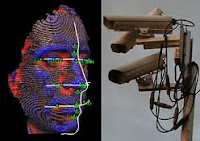
Friday, March 23, 2012

(networkworld)
When you go outside or go to other public places such as a bank or a mall, have you automatically given up your Fourth Amendment rights and consented to a search? When it comes to tracking you via facial recognition technology, what if the government or other law enforcement were to use that argument, that by simply being in a place where there are security cameras, you waived your Fourth Amendment rights and consented to a search?
The FBI and DOD sponsored a legal series about the U.S. government using facial recognition; the latest forum was titled "Striking the Balance - A Government Approach to Facial Recognition Privacy and Civil Liberties." Whenever the word 'balance' is used, privacy and civil liberties are usually about to be kicked in the name of 'security.' When it comes to surveillance via facial recognition technology, federal law enforcement, intelligence personnel and national security agencies are looking into the "gaps in legal/policy authority that may result in privacy and civil liberties vulnerabilities if left unaddressed."
The Future of Privacy Forum (FPF) Senior Fellow Peter Swire, also a law professor at Ohio State University, spoke about "Facial Recognition by the Government: Privacy and Civil Liberties Issues." Since using "one's facial image, with or without knowledge or consent," can identify and be used to track a person "an inherent tension exists between privacy and facial recognition." The forum was to "examine where the appropriate balance lies between crime and terrorism prevention using facial recognition and robust privacy safeguards." Swire started with two different perspectives about facial recognition, according to FPF.
1) It has always been legal to observe people in public, and facial recognition technology is simply making this easier.
2) Facial recognition technology allows an unprecedented ability to surveil and track people, and this information could be stored indefinitely and correlated with other personal information.
Although "observing a person in public has traditionally not required a warrant," Professor Swire pointed out Fourth Amendment rights figure heavily into the constitutional issues impacting facial recognition tracking. Swire said the Supreme Court's GPS tracking decision "may dramatically impact privacy by requiring law enforcement agents to obtain a warrant to conduct surveillance on suspects in public, something law enforcement has never had to do. However, the fourth amendment contains a consent exception; if an individual consents to a search, a warrant is not required. Professor Swire pointed out that some might argue that individuals consent to going outside or to other public places (i.e. a bank or mall) where security cameras are present."
When the U.S. Supreme Court ruled on U.S. vs. Jones GPS tracking, Justice Sotomayor made a strong case for updating our Fourth Amendment laws to protect privacy in this digital age. Sotomayor, in discussing GPS tracking, wrote, "by making available at a relatively low cost such a substantial quantum of intimate information about any person whom the Government, in its unfettered discretion, chooses to track-may 'alter the relationship between citizen and government in a way that is inimical to democratic society'."
Professor Swire referenced Justice Sotomayor's worries "that constant surveillance by the government could chill free speech and free association." Constant biometric surveillance such as facial recognition technology may also "lead to discrimination." Just because something is legal does not mean it should be done, he advised the government. How should intelligence agencies "determine whether or not a surveillance program is a good idea?" Swire suggested using the New York Times test: "if the program was detailed on the front page of the New York Times, would the public reaction be negative or positive?"
(more)
0 Comments:
